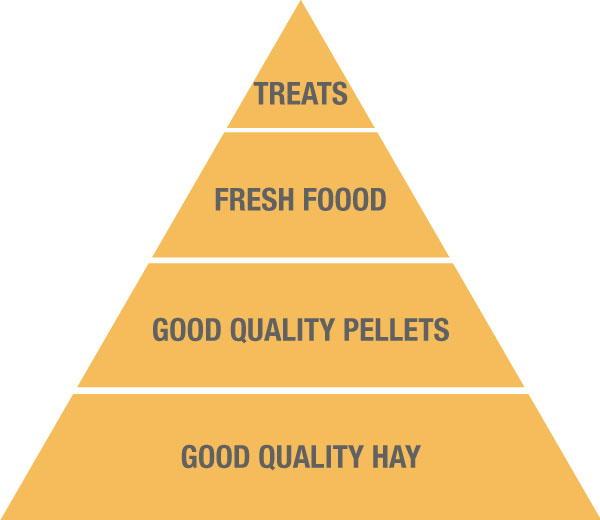Skip to main content
Basic Guinea Pig Care
Housing
- Guinea pigs also known as cavies are sociable rodents. They prefer to live in herds or groups and can become depressed if kept on their own.
- They should be kept in single sex groups, pairs or harems. Sometimes guinea pigs can be incompatible (especially boars) so groups should monitored for any signs of aggression.
- Guinea pigs should not be kept with rabbits as they have different dietary requirements, can transmit diseases to them (or vice versa) & rabbits can cause serious injury to guinea pigs.
- They are prey animals & can mask pain well/be nervous of new sounds and surroundings. This can make them skittish and fearful, so they should be handled carefully.
- Guinea pigs are busy animals, who sleep for short periods of time.
- They are poor climbers and need housing designed with length rather than height.
- The minimum cage size advised for guinea pigs is 120cm x 60cm x 45cm, however offer them as much space as possible.
- They should have access daily to a safe space outside of their hutch.
- Guinea pigs can live indoors and outdoors. However, they are highly susceptible to temperature changes so should not be kept somewhere that is not sheltered and/or has major temperature fluctuations. If kept indoors they should be away from radiators, drafts and windows.
- Guinea pigs should be given multiple areas to hide, cardboard boxes and tunnels provide enrichment for your pets.
Diet
 Guinea pigs are herbivores, they diet should consist of primarily of good quality hay, grass, a variety of greens and limited amounts of pellet food.
Guinea pigs are herbivores, they diet should consist of primarily of good quality hay, grass, a variety of greens and limited amounts of pellet food. - Muesli based guinea pig foods should not be fed as these encourage selective feeding and are usually low in fibre and high in calories.
- A guinea pigs teeth are open rooted, meaning unlike ours they grow continuously. A good quality hay will help wear their teeth down.
- Guinea pigs lack the enzyme required by the body to synthesise Vitamin C and they can only store it for a short period of time. A good quality guinea pig specific food will be supplemented with vitamin C. The shelf life is often short and food should be kept somewhere dark to minimise vitamin C degradation. It is important that guinea pigs are also fed greens, especially dark leafy greens which will be high in vitamin C (kale, spinach, parsley, romaine lettuce, and dandelion greens).
- Adding vitamin C supplements to the water can be ill advised as the change in taste may mean your guinea pig will not drink as much. The vitamin C will also degrade over time, so requires changing at least once daily. If your Guinea pig is ill, your vet may recommend increasing its vitamin C with even further supplementation, as the requirement in ill guinea pigs is higher than in healthy ones.
- Your guinea pigs water should be changed daily. Either a bottle or bowl can be used, or both. When bonding guinea pigs there should be multiple water and food sources to reduce the chance of conflict.
- You may notice your guinea pigs eat some of their faeces. These are called caecotrophs. They are passed in addition to normal faeces and are consumed to maximise the extraction of all the nutrients from their fibrous diet.
Health
- Handling your guinea pigs daily will allow you to closely monitor them for any signs that they may require a visit to the vets. It will also get your guinea pigs used to being checked, and may improve your bond with them.
- Things to check include:
- Weight - Has there been a significant increase or decrease?
- Teeth - Are they misaligned, are they too long, does it look like there has been dribbling?
- Nails - Are they too long, are they curling?
- Feet – Are their feet red or sore?
- Coat - Is there any hair loss or matts, does the coat look dull? Check around the back end to ensure it is clean.
- Eyes - Are the eyes bright, is there any discharge?
- Nose - Is there any discharge or snuffles?
- An annual health check is recommended with an exotics vet, or guinea pig savvy vet.
- It is recommended to weigh your guinea pigs at least once a week, keeping a record will allow you to monitor for any changes, which may signal illness.
Insurance
- We highly recommend taking out insurance for your pet guinea pig, to cover for veterinary fees in case of accident or illness.
 Guinea pigs are herbivores, they diet should consist of primarily of good quality hay, grass, a variety of greens and limited amounts of pellet food.
Guinea pigs are herbivores, they diet should consist of primarily of good quality hay, grass, a variety of greens and limited amounts of pellet food. 





